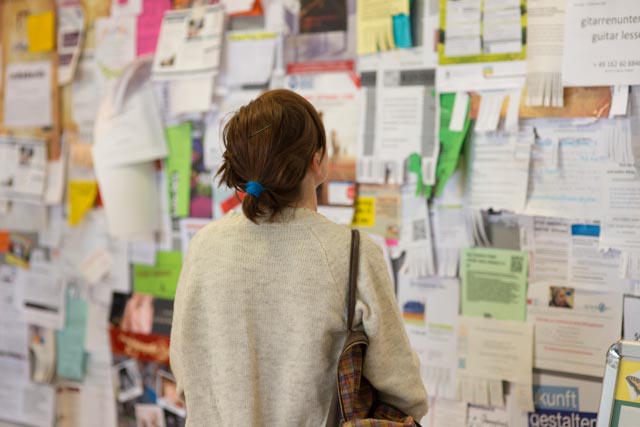Tips for finding accommodation
There are different ways to search for flats. But start early! Demand is highest at the start of the semester.
If you are unable to live in your parents' house, or you choose not to, your choices are either the independent housing market or a place in a hall of residence.
It is important to start looking for a room as early as possible.
Only a small amount of affordable accommodation is available in big cities/conurbations and traditional university towns. Demand for student accommodation is highest at the beginning of the semester.
You can look for accommodation in the following ways:
- Hall of residence: If you want to live in a hall of residence, please contact the Studierendenwerk in charge. Studierendenwerke websites usually have lists of the halls of residence they run.
- Independent housing market: Have a look at the property pages in the local press. You will also find housing offers from residential property companies or flats wanted/offered services on the Internet. Have a look at the notice boards at higher education institutions or stick an “accommodation wanted” notice on the board yourself. Many Studierendenwerke have accommodation points with offers from private providers/landlords.
- Social housing: Subsidised housing requires a Wohnberechtigungsschein, a certificate of eligibility for social housing. Information is available from the housing departments of the local town and district authorities.
- Estate agents: You can also contact an estate agent, but make sure you ask about service costs in advance. Please also note that the independent housing market rarely offers furnished accommodation (unlike Studierendenwerke offers), so you will have to take additional costs for furniture into account.
Rental agreement
Check rental prices carefully and compare them. Is the stated price the base or net rent, or does it include payments for facilities? Remember to take additional fixed costs into account, such as for telephone, Internet, insurance.
Generally speaking, you need to study the rental agreement carefully in your own time in order to make yourself aware of the financial and legal consequences of signing:
- You often only pay a contribution towards the costs of facilities. You may be sent an additional invoice once the annual accounts have been drawn up.
- You normally need to pay a security deposit that generally amounts to 2-3 net rent payments.
- You also need to be alert to possible clauses relating to rent increases (e.g. in a graduated rental agreement) or your own contributions for repairs.
- Finally, please note whether only one person or everyone is the main tenant. If everyone is equal as far as the contract is concerned, then all tenants share the rights and duties therein. If only one person is the main tenant, then he/she has to pay for any temporarily vacant rooms.
Tip: When the keys are handed over, draw up a report (with photos) of anything broken or missing so that you’re on the safe side in terms of repair costs and getting your deposit back.

